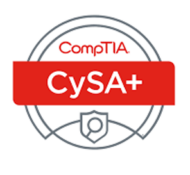Training Description
Duration: 5 days
About the Course
Our Official CompTIA CySA+ Certification Boot Camp is designed to provide you with the knowledge and skills you need to pass the CS0-003 exam and become a certified professional. Our boot camp is led by experienced instructors who are experts in the field of security analytics, threat management, and incident response.
Our CySA+ training program includes:
• Hands-on labs and interactive exercises to give you real-world experience
• Exam-focused instruction and practice test to help you become familiar with the exam format
• Study materials and resources to help you prepare for the exam
• Access to our team of experts who can answer any questions you may have
We understand that preparing for a certification exam can be challenging, that’s why we designed our boot camp to give you the best chance of success. By the end of our program, you will be fully prepared to pass the CompTIA CySA+ certification exam and take the next step in your career.
Who Should Attend
CompTIA CySA+ exam-takers come from all walks of life with various experience levels in IT and cybersecurity. Although there are no prerequisites for CompTIA CySA+, we recommend a minimum of three-to-four years of hands-on information security or related experience before taking the exam.
CompTIA CySA+ is intended to follow CompTIA Security+ or equivalent experience and has a technical, hands-on focus. The degree of experience and the quality of experience in cybersecurity and analysis you’ve already acquired has a substantial impact on the knowledge gap between what you know and what’s expected of you to know.
You will be able to
- Detect and analyze indicators of malicious activity
- Understand threat hunting and threat intelligence concepts
- Use appropriate tools and methods to manage, prioritize, and respond to attacks and vulnerabilities
- Perform incident response processes
- Understand reporting and communication concepts related to vulnerability management and incident response activities
Why is CySA+ different?
- CompTIA CySA+ is the only intermediate high-stakes cybersecurity analyst certification with both hands-on, performance-based questions and multiple-choice questions.
- CySA+ focuses on the candidates ability to not only proactively capture, monitor, and respond to network traffic findings, but also emphasizes software and application security, automation, threat hunting, and IT regulatory compliance, which affects the daily work of security analysts.
- CySA+ covers the most up-to-date core security analyst skills and upcoming job skills used by threat intelligence analysts, application security analysts, compliance analysts, incident responders/handlers, and threat hunters, bringing new techniques for combating threats inside and outside of the Security Operations Center (SOC).
What’s included?
- Authorized Courseware
- Intensive Hands on Skills Development with an Experienced Subject Matter Expert
- Hands-on practice on real Servers and extended lab support 1.800.482.3172
- Examination Vouchers & Onsite Certification Testing- (excluding Adobe and PMP Boot Camps)
- Academy Code of Honor: Test Pass Guarantee
- Optional: Package for Hotel Accommodations, Lunch and Transportation
With several convenient training delivery methods offered, The Academy makes getting the training you need easy. Whether you prefer to learn in a classroom or an online live learning virtual environment, training videos hosted online, and private group classes hosted at your site. We offer expert instruction to individuals, government agencies, non-profits, and corporations. Our live classes, on-sites, and online training videos all feature certified instructors who teach a detailed curriculum and share their expertise and insights with trainees. No matter how you prefer to receive the training, you can count on The Academy for an engaging and effective learning experience.
Methods
- Instructor Led (the best training format we offer).
- Live Online Classroom – Online Instructor Led.
- Self-Paced Video.
Speak to an Admissions Representative for complete details.
| Start | Finish | Public Price | Public Enroll | Private Price | Private Enroll |
|---|---|---|---|---|---|
| 5/12/2025 | 5/16/2025 | ||||
| 6/2/2025 | 6/6/2025 | ||||
| 6/23/2025 | 6/27/2025 | ||||
| 7/14/2025 | 7/18/2025 | ||||
| 8/4/2025 | 8/8/2025 | ||||
| 8/25/2025 | 8/29/2025 | ||||
| 9/15/2025 | 9/19/2025 | ||||
| 10/6/2025 | 10/10/2025 | ||||
| 10/27/2025 | 10/31/2025 | ||||
| 11/17/2025 | 11/21/2025 | ||||
| 12/8/2025 | 12/12/2025 | ||||
| 12/29/2025 | 1/2/2026 |
Curriculum
Security Operations
- Explain the importance of system and network architecture concepts in security operations
- Given a scenario, analyze indicators of potentially malicious activity
- Given a scenario, use appropriate tools or techniques to determine malicious activity
- Compare and contrast threat-intelligence and threat-hunting concepts
- Explain the importance of efficiency and process improvement in security operations
Vulnerability Management
- Given a scenario, implement vulnerability scanning methods and concepts
- Given a scenario, analyze output from vulnerability assessment tools
- Given a scenario, analyze data to prioritize vulnerabilities
- Given a scenario, recommend controls to mitigate attacks and software vulnerabilities
- Explain concepts related to vulnerability response, handling, and management
Incident Response and Management
- Explain concepts related to attack methodology frameworks
- Given a scenario, perform incident response activities
- Explain the preparation and post-incident activity phases of the incident management life cycle
Reporting and Communication
- Explain the importance of vulnerability management reporting and communication
- Explain the importance of incident response reporting and communication


